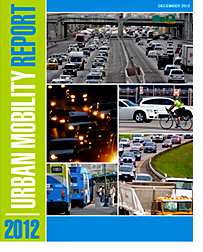
University calculates cost of congestion in Boise
The next time you’re stuck in traffic on the interstate, with one eye focused on the car in front and your other eye on the clock, remember it could be much worse. You could be commuting to the nation’s capital from a nearby suburb.
Researchers at the Texas A&M Transportation Institute (TTI) released the 2012 Urban Mobility Report (based on 2011 data) this week that tracks the costs of travel delays nationwide. Among the largest urban areas, Washington, D.C. has the worst congestion, longest traffic delays and highest costs of gridlock.
Boise drivers, listed under small urban areas with populations less than 500,000, experience much shorter delays and related congestion costs.
 The report ranks Boise 94th among all cities with an annual delay of 16 hours per auto commuter. In other words, Boise drivers spend an extra two days of work time sitting in traffic. That translates to an extra eight gallons of gas and an associated commuting cost of $334 per auto commuter.
The report ranks Boise 94th among all cities with an annual delay of 16 hours per auto commuter. In other words, Boise drivers spend an extra two days of work time sitting in traffic. That translates to an extra eight gallons of gas and an associated commuting cost of $334 per auto commuter.
The small urban category also includes Salem, Ore, Provo-Orem, Utah, Spokane, Wash., Anchorage, Alaska, and Eugene Ore.
Delays in Boise have a residual impact on the city of 3.6 million lost hours (ranking 95th nationally) and 1.6 million gallons of wasted fuel (96th). Congestion costs commercial vehicle operators $10 million.
The report also calculates the impact of idling vehicles on the environment. In Boise, congestion accounts for an additional 26 million pounds of CO2 released into the air annually.
Hours wasted in Boise traffic has remained relatively steady the past decade but is significantly improved since 2000 when commuters lost an estimated 31 hours of productivity per auto commuter. Lost hours declined to 24 in 2005, 23 in 2010 and 23 in 2011. More than half of the cities in the small urban area experienced steady increases in travel delays since 2000.
“The 2011 data are consistent with one past trend, congestion will not go away by itself – action is needed!” according to the report summary. “The problem is very large. In 2011, congestion caused urban Americans to travel 5.5 billion hours more and to purchase an extra 2.9 billion gallons of fuel for a congestion cost of $121 billion.
“Second, in order to arrive on time for important trips, travelers had to allow for 60 minutes to make a trip that takes 20 minutes in light traffic.
“Third, while congestion is below its peak in 2005, there is only a short-term cause for celebration. Prior to the economy slowing, just five years ago, congestion levels were much higher than a decade ago; these conditions will return as the economy improves.
“The data show that congestion solutions are not being pursued aggressively enough.
“The most effective congestion reduction strategy, however, is one where agency actions are complemented by efforts of businesses, manufacturers, commuters and travelers. There is no rigid prescription for the “best way” – each region must identify the projects, programs and policies that achieve goals, solve problems and capitalize on opportunities.
Published 2-8-2013